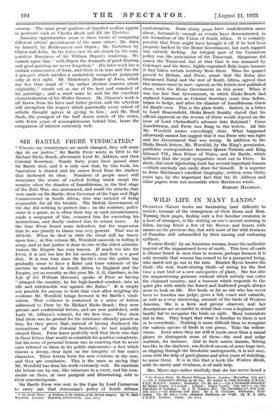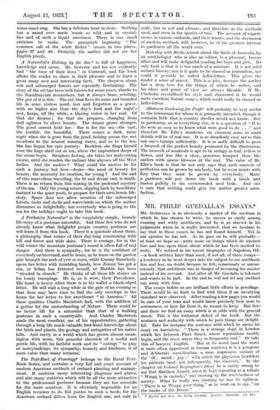WILD LIEF, IN MANY LANDS.*
OVERSEAS Nature books are fascinating (and difficult) to review, because of the strangeness of their fauna and flora. Turning their pages, finding only a few familiar creatures in a host of strangers, is like waking on one's second morning in Eden, having fitted a few of the flowers and beasts with names on the previous day, but with most of the wild denizens of Paradise still unhanselled by their taming and endearing epithets.
Western Birds,' by an American woman, bears the authentic imprint of the impassioned lover of earth. This love of earth is oftener found in men than in women, perhaps because it is only recently that woman has ceased to be a pampered being, who dared not go out in the rain. Harriet Myers knows the thrill—the real, heart-stirring thrill—of seeing for the first time a rare bird or a new sub-species of plant. She has also the unquestioning patience without which nobody can enter the charmed country, and a humour which responds to the quiet glee with which the furred and feathered people always seem to look on life. Her book, so far as one who has never been to America can judge, gives a full, exact and valuable, as well as a very interesting, account of the birds of Western America. She is a keen and precise observer, and her descriptions are so careful in detail that even a beginner could hardly fail to recognize the birds on sight. Many naturalists fail in this. They forget that what is familiar to them is not so to everybody. Nothing is more difficult than to recognize the various species of birds in one genus. Take the willow- wrens. Even when they are still it needs more than a casual glance to distinguish some of them—the reed and sedge warblers, for instance. And in their native haunts, flitting bee-like in the shadowy, sun-flecked cavern of some huge tree, or slipping through the brookside undergrowth, it is not easy, even with the help of good glasses and after years of watching, to name them. It is in this that a book like Western Birds, with its nicety and vividness, is of such help.
Mrs. Myers says rather wistfully that she has never heard a
• (I) Western Birds. By Harriet Williams Myers. London : Macmillan. f18s. net.] —(2) A Naturalist's Holiday by the Sea. By Arthur de Carle Sowerby, F.R.G.S., F.Z.S., M.B.O.U. London : Boutledge. [7s. ad. net.]—.(3) A Perthshire Naturalist. By Henry Coates, F.S.A.Scot. London : Fisher Unwin. (18s.met.]---(4) The Text-Book of Posology. By J. H. Gourley, M.S. The Macmillan Co., New York. D.2s. net.)—(5) Mateship with Birds. By A. H. Chisholm. Melbourne : Whit- comb.. Us. ad. net.1---(8) ..filkirsent Gardening for Profit. BY R. T. Ellis, F.R.H.S. London : Clarke. [2s. net.]
water-ousel sing. She has a delicious treat in store. Nothing but a naiad ever made music so wild and so crystal- line and of such a liquid sweetness. There is one small criticism to make. The paragraph beginning " The common call of the adult flicker " occurs in two places, pages 37 and 40. Probably the author did not see her English proofs.
A Naturalist's Holiday by the Sea is full of happiness, knowledge and ozone. Mr. Sowerby and his son evidently had " the time of their lives " in Cornwall, and the book allows the reader to share in their pleasure and to learn a great many new and interesting facts. The chapters about eels and submerged forests are especially fascinating. The story of the eel has been well known for some years, thanks to the Scandinavian researchers, but it always bears retelling. The gist of it is this. The eel, that lives its mute and bounded life in some stirless pond, lost and forgotten as a grave, with no higher aim than the day's food and the night's rest, keeps, all the while, a blazing vision in her soul. Of that she dreams ; for that she prepares, changing from dull ugliness to silver beauty. The dream grows stronger. The pond cannot hold her. She is for the sea—the vast, the terrible, the beautiful. There comes a dark, rainy night when she is gone from the pond, lashing across the wet meadows to the nearest running water, and so to the sea. She has begun her epic journey. Reckless, she flings herself over the huge shelf out at sea, where the unplumbed deeps of the ocean begin. Sleepless, fasting, she takes her undeviating course, until she reaches the radiant blue abysses off the West Indies. And the motive ? What could the motive be for such a journey but love—desire—the need of beauty for beauty, the necessity for creation, for young ? And the end of this marvellous travelling, the fit and divine end, is death. There is no return from this mating in the profound mystery of the sea. Only the young return, slipping back by hereditary instinct to the quiet pools, to prepare for their own heroic life- story. Space does not allow mention of the submerged forests, rocks and shells and water-birds on which the author discourses so delightfully, but everybody who is going to the sea for the holidays ought to take this book.
A Perthshire Naturalist3 is the exquisitely simple, homely life-story of a postman naturalist. And those few who do not already know what delightful people country postmen are will learn it from this book. There is a quietude about them, a philosophy that comes of their day-long communing with hill and forest and wide skies. There is courage, for in the wild winter the mountain postman's round is often full of real danger. And there is sympathy, for he is the confidant of everybody on his round, and he hears, as he leans on the garden gate beneath the arch of yew or roses, while Granny Somebody opens her letter with trembling hands, how Jimmy has got a rise, or Selina has bettered herself, or Matilda has been " shouted in church." He thinks of all these life stories on his lonely trampings. He is, as it were, their Providence. His heart is heavy when there is in his wallet a black-edged letter. He will wait a long while at the gate of an evening so that Jane may have time to find the only envelope in the house for her letter to her sweetheart " at America." All these qualities Charles Macintosh had, with the addition of a genius for the understanding of Nature. There could be no better life for a naturalist than that of a walking postman in such a countryside. And Charles Macintosh made the most excellent use of his opportunities, gathering through a long life much valuable first-hand knowledge about the birds and plants, the geology and antiquities of his native hills. And surely in a world which has grown almost mean- ingless with noise, this peaceful chronicle of a useful and gentle life, with its faithful work and its " outings " to play at merrymakings, its sympathy, honesty and kindness, is of more value than many sermons.
The Text-Book of Pomology4 belongs to the Rural Text- Book Series, and contains a very full and exact account of modem American methods of orchard planting and manage- ment. It contains many interesting diagrams and plates, and also many statistics which will be all the more attractive to the professional gardener because they are too scientific for the mere amateur. It is obviously impossible for an English reviewer to do full justice to such a book, for the American orchard differs from the English one, not only in
scale, but in soil and climate, and therefore in the methods used, and even in the species of tree. The account of experi- ments in various orchards, and their results, and the discussion of modern methods will, however, be of the greatest interest to gardeners all the world over.
Mateship with Birds,' a book about the birds of Australia, by an ornithologist who is also an editor, is a pleasant, breezy affair and will make delightful reading for boys and girls. Its only fault is that it is too much of a mixture. It is not solid natural history, nor is it quite to be classed as journalism, nor could it possibly be called belles-lettres. This gives the reader a sense of unrest. This is a pity, because the author has a deep love for the things of which he writes, and his ideas and point of view are always likeable. If Mr. Chisholm crystallized his style and chastened it he would write excellent Nature essays, which could really be classed as belles-lettres.
Allotment Gardening for Profit, will probably be very useful to the townsman for whom it is primarily intended, though it contains little that a country dweller would not know. But in gardening, as in everything else, it is a question of " If to do were as easy as to know what were good to do . . ." and therefore Mr. Ellis's insistence on common sense in small details will be of real use. It is so dreadfully easy not to thin out one's turnips sufficiently. It is so sadly difficult to grow a broccoli of the perfect beauty possessed by the illustration. The broccoli of amateurs is apt to be stringy in leaf, yellow in flower, and less like a close, generous bouquet than like antlers with sparse blossom at the end. The value of Mr. Ellis's book is that he not only says that such marvels of perfection can be grown by anybody, but he even insists with fury that they must be grown by everybody. Many a gardener will put down the book with a blush and hasten guiltily to his overcrowded seed beds. And one is sure that nothing could give the author greater satis- faction.



































 Previous page
Previous page